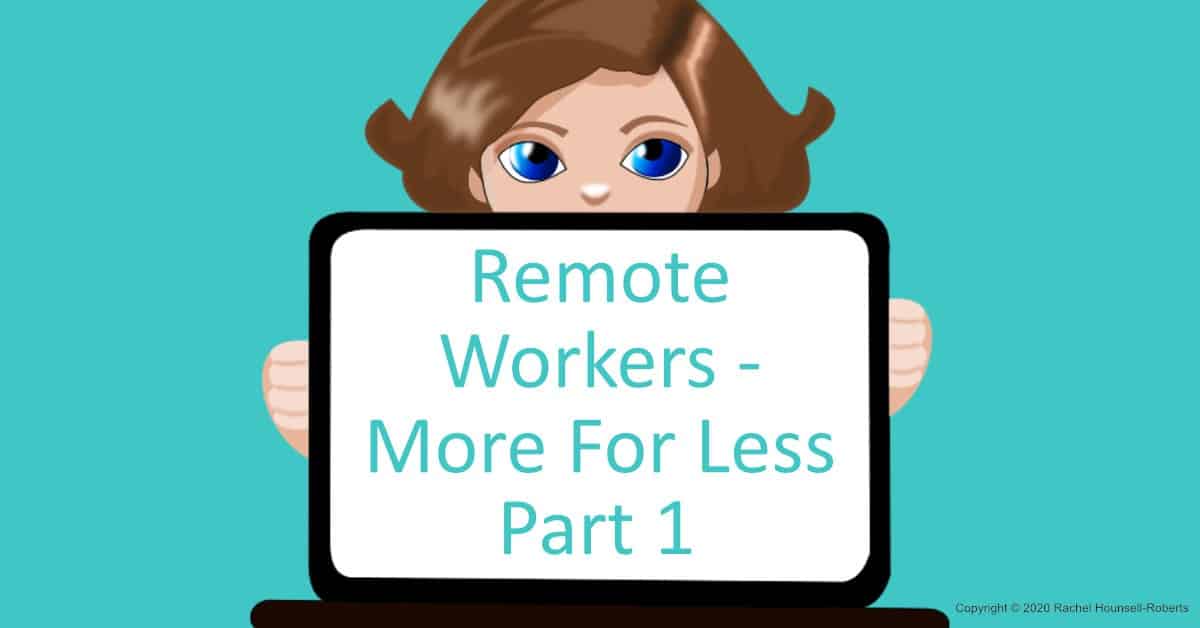
Why is Telework important to SMEs? Every owner dreads running out of cash, how can telework help? In start-up mode they need to eek out the money long enough to build the customer base and get off the ground. Scale-ups need cash to ramp up. Dips in income happen, so managing cashflow is vital. So how does Telework, also called mobile working or remote working, help?
Telework means employees use tech such as laptops and smart phones to work remotely, typically from home, instead of commuting to an office. In this three-part series I examine three different aspects of how telework helps SMEs. In this first blog I look at cash. Part-two looks at productivity, and the final part looks at staff engagement and retention.
In 2000 I was a co-founder of a start-up business that quickly set-up an office for the six of us. That was right before the dot com crash. In that downturn, we were burning cash for our serviced office just as the income dried up. Locked into a big monthly payment pretty much the same as the payroll for a single head count. We had to let many of the staff go, and yet, every month we were still paying for the office. A very painful experience. Having learnt from the experience we tried different ways of working until we finally had a blend of office hubs and remote workers.
Why is cash important

I suppose cash isn’t important, that is until you run out or need cash to grow. It’s often the difference between success and failure. Start-ups need cash to give them a runway. Scale-ups need cash to invest for growth. On the flip side, cash problems take their toll. Stress, sleepless nights, missed opportunities, lack of investment and in some cases cause a steady decline and death spiral.
Being smart
Before I start into how telework can save money, I should put that in context. This article is about being smart with your money. Telework could be a disaster without the right tools and support. The focus is on improving the business and tech innovation.
Getting the right tools is much improved by have a clear understanding of your business system. Our Business System: An Essential Guide to Growth guide will help you design a robust system for better results.
Reducing Office Cost
Most small businesses will start at home, but what happens when you want to take on staff to grow. The UK Government has encouraged flexible working to make better use of resources and promote diversity. Flipping this on its head means there is an opportunity for small businesses to make more use of Telework. For example, there is guidance for telework in employment, and health and safety law.
Owners might want to think carefully about why they want an office. They might want to quantify how much time the team need to be together in the same space, or time for support. If the reason is physical paperwork or processes, they might consider digital transformation.

These days there are several options to suit a small business. Many of these options are a fraction of the cost of a private office. For example, co-working spaces are very popular and used by both small and large companies. These provide a good quality shared workplace along with facilities such as meeting rooms. If your business is set-up digitally, then employees can use their laptop and office Wi-Fi to get on with their work in a safe and enjoyable space.
Reducing Recruitment cost

When you factor in time and lost output, the cost of replacing staff is over £30K. For an owner of a small business that’s already maxed out, there’s a personal cost too. During the twenty to thirty weeks to replace a person, what happens to the business? If the business owner is busy covering the bases, what’s the impact to the rest of the business?
The good news is that according to a Stanford University report, teleworkers tend to be happier and stick around. They found that that job attrition rates fell by over half. Telework provides more flexibility. That might mean retaining an employee juggling family commitments or health issues.
Reducing Support Cost

In the early days of my previous start-up and scale-up I was providing technical sales support, customer support and consulting. Most of our prospects and customers were in the USA, some on the West coast with an eight-hour difference. In the early days I was routinely working until eight or nine at night. At the time I had a young family, and without working from home it would have been too much. It meant that I could see my children before they went to bed. It meant being able to eat dinner as soon as I was off the call instead of after the delay of travelling home. Telework meant that the business could support our clients without the cost of additional support staff.
What do you need for Telework?
Telework can save considerable cost, boost productivity and increase staff engagement. There’s also an upfront investment. Although the basic equipment for working at home is a laptop and phone, there’s more to making it work well. Staff need to be reasonably autonomous, which means that tasks need to be clear and measurable. They need the right tools, with access to information, and systems to coordinate activities. Staff need support, career progression and feel part of the team. Over the coming series we’ll dig into that in more detail.


Very interesting and useful message Rogan.